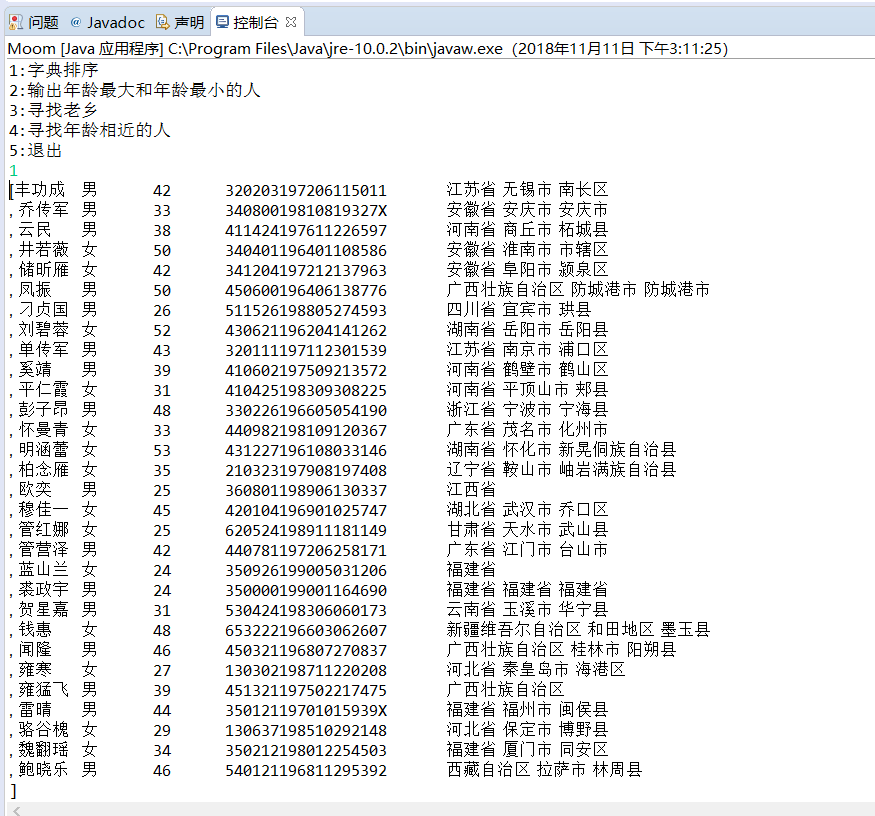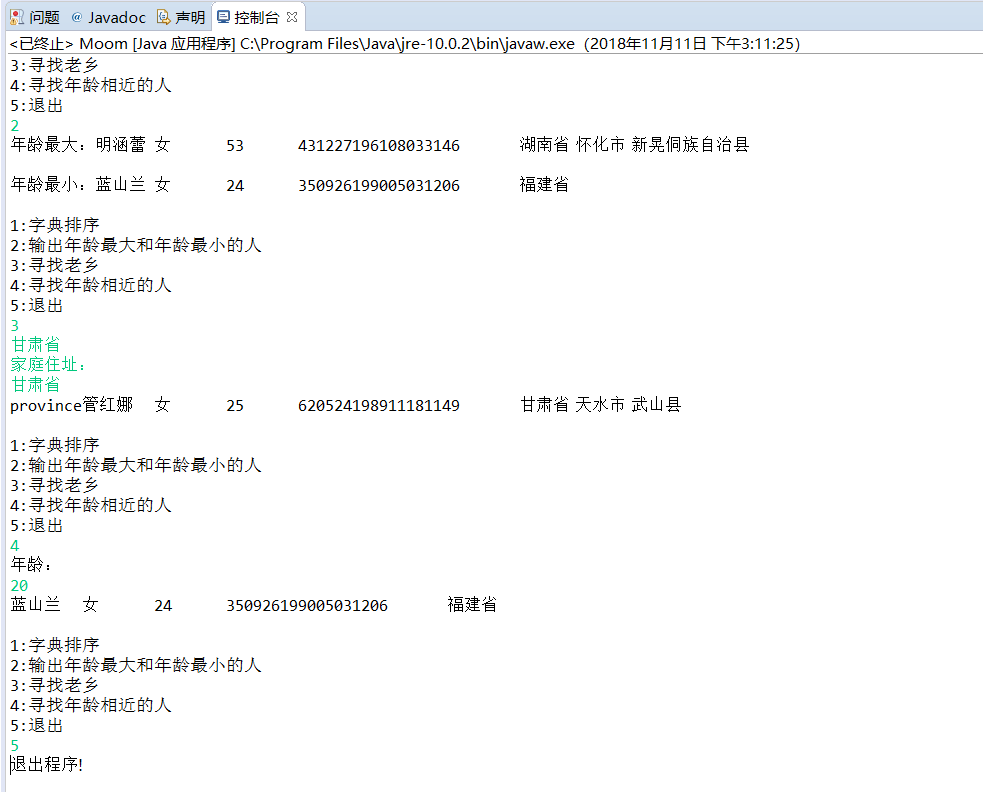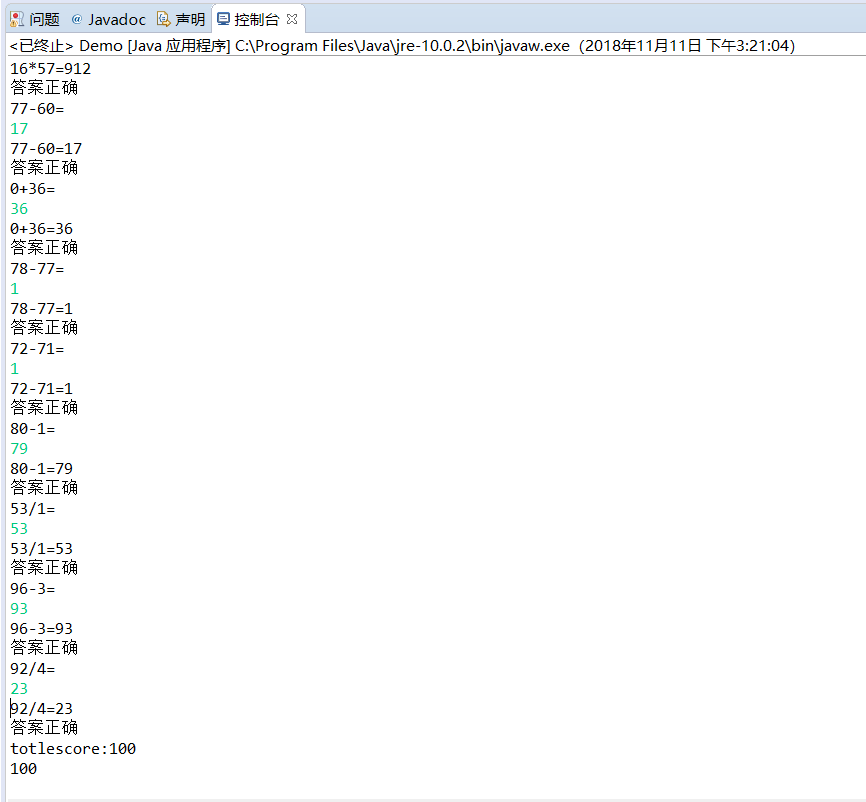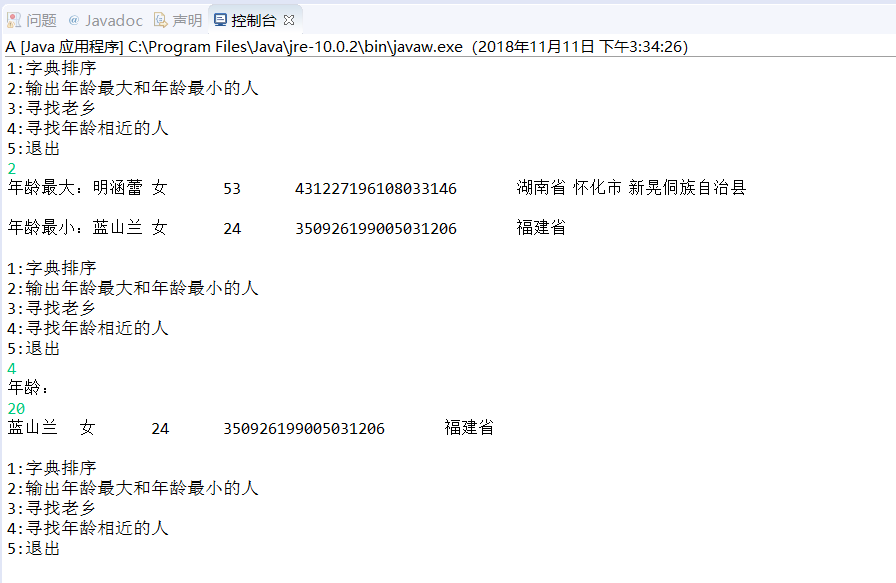第十一周总结
一、知识总结
1.Collection和Map是Java集合框架的根接口。
2.List接口和Set接口继承自Collection接口。
3.Set无序不允许元素重复。
HashSet (无序)
TreeSet (有序)
4.List有序且允许元素重复。
ArrayList
LinkedList
Vector
5.Map也属于集合系统,但和Collection接口没关系。Map是key对value的映射集合,其中key列就是一个集合。key不能重复,但是value可以重复。
HashMap (无序)
TreeMap (有序)
WeakHashMap
Hashtable (无序,线程安全)
6.SortedSet和SortedMap接口对元素按指定规则排序,SortedMap是对key列进行排序。
7.ArrayList和Vector区别
ArrayList和Vector都实现了List接口,都是通过数组实现的。
ArrayList是非线程安全的, Vector是线程安全的。
List第一次创建的时候,会有一个初始大小,随着不断向List中增加元素,当List 认为容量不够的时候就会进行扩容。ArrayList增长原来的50%,Vector缺省情况下自动增长原来一倍的数组长度。
8.ArrayList和LinkedList区别及使用场景
区别:
ArrayList底层是用数组实现的,可以认为ArrayList是一个可改变大小的数组, 查找速度快。随着越来越多的元素被添加到ArrayList中,其大小是动态增加的。
LinkedList底层是通过双向链表实现的, LinkedList和ArrayList相比,增删的速度较快。但是查询和修改值的速度较慢。同时,LinkedList还实现了Queue接口,所以他还提供了offer(),peek(), poll()等方法。
使用场景:
ArrayList更适合快速检索、以及在末尾插入或删除(数组的特性)。
LinkedList更适合从中间插入或者删除(链表的特性)。
二、实验
1、实验目的与要求
(1) 掌握Vetor、Stack、Hashtable三个类的用途及常用API;
(2) 了解java集合框架体系组成;
(3) 掌握ArrayList、LinkList两个类的用途及常用API。
(4) 了解HashSet类、TreeSet类的用途及常用API。
(5)了解HashMap、TreeMap两个类的用途及常用API;
(6) 结对编程(Pair programming)练习,体验程序开发中的两人合作。
2、实验内容和步骤
实验1: 导入第9章示例程序,测试程序并进行代码注释。
测试程序1:
l 使用JDK命令运行编辑、运行以下三个示例程序,结合运行结果理解程序;
l 掌握Vetor、Stack、Hashtable三个类的用途及常用API。

import java.util.Vector; class Cat { private int catNumber; Cat(int i) { catNumber = i; } void print() { System.out.println("Cat #" + catNumber); } } class Dog { private int dogNumber; Dog(int i) { dogNumber = i; } void print() { System.out.println("Dog #" + dogNumber); } } public class CatsAndDogs { public static void main(String[] args) { Vector cats = new Vector(); for (int i = 0; i < 7; i++) cats.addElement(new Cat(i)); cats.addElement(new Dog(7)); for (int i = 0; i < cats.size(); i++) ((Cat) cats.elementAt(i)).print();//进行强制类型转化 } }
示例一结果:

由结果知道示例一代码不合适,改后为:

import java.util.Vector;//实现自动增长的对象数组 class Cat { private int catNumber; Cat(int i) { catNumber = i; } void print() { System.out.println("Cat #" + catNumber); } } class Dog { private int dogNumber; Dog(int i) { dogNumber = i; } void print() { System.out.println("Dog #" + dogNumber); } } public class CatsAndDogs { public static void main(String[] args) { Vector cats = new Vector(); for (int i = 0; i < 7; i++) cats.addElement(new Cat(i)); cats.addElement(new Dog(7)); for (int i = 0; i < cats.size(); i++) if (cats.elementAt(i) instanceof Cat) //判断是否能进行强制类型转换 { ((Cat) cats.elementAt(i)).print();//能进行强制类型转换,输出为Cat型 } else { ((Dog) cats.elementAt(i)).print();//不能进行强制类型转化,输出为Dog型 } } }
改后结果为:


import java.util.*; public class Stacks //定义栈 { static String[] months = { "1", "2", "3", "4" }; public static void main(String[] args) { Stack stk = new Stack(); for (int i = 0; i < months.length; i++) stk.push(months[i]);//进栈操作 System.out.println(stk); System.out.println("element 2=" + stk.elementAt(2)); while (!stk.empty()) System.out.println(stk.pop());//出栈操作,并输出 } }
结果:


import java.util.*; class Counter { int i = 1;//i不加权限修饰符,所以i的缺省权限修饰符应该是friendly型 public String toString() //转为字符串类型的数据 { return Integer.toString(i); } } public class Statistics { public static void main(String[] args) { Hashtable ht = new Hashtable();//Hashtable保存集合数据,用键值对的方式保存集合数据 for (int i = 0; i < 10000; i++) { Integer r = new Integer((int) (Math.random() * 20));//生成0到19,即20个整型随机数 if (ht.containsKey(r))//判断r是否是哈希表中一个元素的键值 ((Counter) ht.get(r)).i++;//利用Counter类对象去引用属性值 else ht.put(r, new Counter());//r是随机数,新创建的Counter对象的初始值是1 } System.out.println(ht); } }
结果:

测试程序2:
l 使用JDK命令编辑运行ArrayListDemo和LinkedListDemo两个程序,结合程序运行结果理解程序;

import java.util.*; public class ArrayListDemo//ArrayList使用了数组的实现 { public static void main(String[] argv) { ArrayList al = new ArrayList(); //在ArrayList中添加大量元素 al.add(new Integer(11)); al.add(new Integer(12)); al.add(new Integer(13)); al.add(new String("hello"));//下标从0开始,添加4个元素 // First print them out using a for loop. System.out.println("Retrieving by index:"); for (int i = 0; i < al.size(); i++) { System.out.println("Element " + i + " = " + al.get(i));//通过get方法找到 } } }
结果:

添加一个输出一个集合对象的结果:


import java.util.*; public class LinkedListDemo { public static void main(String[] argv) { LinkedList l = new LinkedList(); l.add(new Object()); l.add("Hello"); l.add("zhangsan"); ListIterator li = l.listIterator(0); while (li.hasNext()) System.out.println(li.next()); if (l.indexOf("Hello") < 0) System.err.println("Lookup does not work"); else System.err.println("Lookup works"); } }
结果:

在Elipse环境下编辑运行调试教材360页程序9-1,结合程序运行结果理解程序;
l 掌握ArrayList、LinkList两个类的用途及常用API。

import java.util.*; /** * This program demonstrates operations on linked lists. * @version 1.11 2012-01-26 * @author Cay Horstmann */ public class LinkedListTest { public static void main(String[] args) { //创建a和b两个链表 List<String> a = new LinkedList<>(); a.add("Amy"); a.add("Carl"); a.add("Erica"); List<String> b = new LinkedList<>(); b.add("Bob"); b.add("Doug"); b.add("Frances"); b.add("Gloria"); //合并a和b中的词 ListIterator<String> aIter = a.listIterator(); Iterator<String> bIter = b.iterator(); while (bIter.hasNext()) { if (aIter.hasNext()) aIter.next(); aIter.add(bIter.next()); } System.out.println(a); //从第二个链表中每隔一个元素删除一个元素 bIter = b.iterator(); while (bIter.hasNext()) { bIter.next(); // skip one element if (bIter.hasNext()) { bIter.next(); // skip next element bIter.remove(); // remove that element } } System.out.println(b); // bulk operation: remove all words in b from a a.removeAll(b); System.out.println(a);//通过toString方法打印出链表a中的所有元素 } }

测试程序3:
l 运行SetDemo程序,结合运行结果理解程序;

import java.util.*; public class SetDemo { public static void main(String[] argv) { HashSet h = new HashSet(); //也可以 用Set h=new HashSet(); h.add("One"); h.add("Two"); h.add("One"); // 复制 h.add("Three"); Iterator it = h.iterator(); while (it.hasNext()) { System.out.println(it.next()); } } }
结果:

|在Elipse环境下调试教材365页程序9-2,结合运行结果理解程序;了解HashSet类的用途及常用API。
l 在Elipse环境下调试教材367页-368程序9-3、9-4,结合程序运行结果理解程序;了解TreeSet类的用途及常用API。

import java.util.*; /** * This program uses a set to print all unique words in System.in. * @version 1.12 2015-06-21 * @author Cay Horstmann */ public class SetTest { public static void main(String[] args) { Set<String> words = new HashSet<>(); // HashSet implements Set long totalTime = 0; try (Scanner in = new Scanner(System.in)) { while (in.hasNext()) { String word = in.next(); long callTime = System.currentTimeMillis(); words.add(word); callTime = System.currentTimeMillis() - callTime; totalTime += callTime; } } Iterator<String> iter = words.iterator(); for (int i = 1; i <= 20 && iter.hasNext(); i++) System.out.println(iter.next()); System.out.println(". . ."); System.out.println(words.size() + " distinct words. " + totalTime + " milliseconds."); } }

import java.util.*; /** * An item with a description and a part number. */ public class Item implements Comparable<Item>//接口 { private String description; private int partNumber; /** * Constructs an item. * * @param aDescription * the item's description * @param aPartNumber * the item's part number */ public Item(String aDescription, int aPartNumber)//构造器 { description = aDescription; partNumber = aPartNumber; } /** * Gets the description of this item. * * @return the description */ public String getDescription() { return description; } public String toString() { return "[description=" + description + ", partNumber=" + partNumber + "]"; } public boolean equals(Object otherObject) { if (this == otherObject) return true; if (otherObject == null) return false; if (getClass() != otherObject.getClass()) return false; Item other = (Item) otherObject; return Objects.equals(description, other.description) && partNumber == other.partNumber; } public int hashCode() { return Objects.hash(description, partNumber); } public int compareTo(Item other)//排序 { int diff = Integer.compare(partNumber, other.partNumber); return diff != 0 ? diff : description.compareTo(other.description); } }

package treeSet; import java.util.*; /** * An item with a description and a part number. */ public class Item implements Comparable<Item> { private String description; private int partNumber; /** * Constructs an item. * * @param aDescription * the item's description * @param aPartNumber * the item's part number */ public Item(String aDescription, int aPartNumber) { description = aDescription; partNumber = aPartNumber; } /** * Gets the description of this item. * * @return the description */ public String getDescription() { return description; } public String toString() { return "[description=" + description + ", partNumber=" + partNumber + "]"; } public boolean equals(Object otherObject) { if (this == otherObject) return true; if (otherObject == null) return false; if (getClass() != otherObject.getClass()) return false; Item other = (Item) otherObject; return Objects.equals(description, other.description) && partNumber == other.partNumber; } public int hashCode() { return Objects.hash(description, partNumber); } public int compareTo(Item other) { int diff = Integer.compare(partNumber, other.partNumber); return diff != 0 ? diff : description.compareTo(other.description); } }
结果:

测试程序4:
l 使用JDK命令运行HashMapDemo程序,结合程序运行结果理解程序;

import java.util.*; public class HashMapDemo //基于哈希表的 Map接口的实现,提供所有可选的映射操作 { public static void main(String[] argv) { HashMap h = new HashMap(); // 哈希映射从公司名称到地址 h.put("Adobe", "Mountain View, CA"); h.put("IBM", "White Plains, NY"); h.put("Sun", "Mountain View, CA"); String queryString = "Adobe"; String resultString = (String)h.get(queryString); System.out.println("They are located in: " + resultString); } }
结果:

l 了解HashMap、TreeMap两个类的用途及常用API。l 在Elipse环境下调试教材373页程序9-6,结合程序运行结果理解程序;

import java.util.*; /** * This program demonstrates the use of a map with key type String and value type Employee. * @version 1.12 2015-06-21 * @author Cay Horstmann */ public class MapTest { public static void main(String[] args) { Map<String, Employee> staff = new HashMap<>(); staff.put("144-25-5464", new Employee("Amy Lee")); staff.put("567-24-2546", new Employee("Harry Hacker")); staff.put("157-62-7935", new Employee("Gary Cooper")); staff.put("456-62-5527", new Employee("Francesca Cruz")); // print all entries System.out.println(staff); // remove an entry staff.remove("567-24-2546"); // replace an entry staff.put("456-62-5527", new Employee("Francesca Miller")); // look up a value System.out.println(staff.get("157-62-7935")); // iterate through all entries staff.forEach((k, v) -> System.out.println("key=" + k + ", value=" + v)); } }
结果:

实验2:结对编程练习:
l 关于结对编程:以下图片是一个结对编程场景:两位学习伙伴坐在一起,面对着同一台显示器,使用着同一键盘,同一个鼠标,他们一起思考问题,一起分析问题,一起编写程序。
以下实验,就让我们来体验一下结对编程的魅力。
l 确定本次实验结对编程合作伙伴:达拉草

l 各自运行合作伙伴实验九编程练习1,结合使用体验对所运行程序提出完善建议;
import java.io.BufferedReader; import java.io.File; import java.io.FileInputStream; import java.io.FileNotFoundException; import java.io.IOException; import java.io.InputStreamReader; import java.util.ArrayList; import java.util.Arrays; import java.util.Collections; import java.util.Scanner; public class Moom{ private static ArrayList<Mest> studentlist; public static void main(String[] args) { studentlist = new ArrayList<>(); Scanner scanner = new Scanner(System.in); File file = new File("D:\身份证号.txt"); try { FileInputStream fis = new FileInputStream(file); BufferedReader in = new BufferedReader(new InputStreamReader(fis)); String temp = null; while ((temp = in.readLine()) != null) { Scanner linescanner = new Scanner(temp); linescanner.useDelimiter(" "); String name = linescanner.next(); String number = linescanner.next(); String sex = linescanner.next(); String age = linescanner.next(); String province =linescanner.nextLine(); Mest student = new Mest(); student.setName(name); student.setnumber(number); student.setsex(sex); int a = Integer.parseInt(age); student.setage(a); student.setprovince(province); studentlist.add(student); } } catch (FileNotFoundException e) { System.out.println("学生信息文件找不到"); e.printStackTrace(); } catch (IOException e) { System.out.println("学生信息文件读取错误"); e.printStackTrace(); } boolean isTrue = true; while (isTrue) { System.out.println("1:字典排序"); System.out.println("2:输出年龄最大和年龄最小的人"); System.out.println("3:寻找老乡"); System.out.println("4:寻找年龄相近的人"); System.out.println("5:退出"); String m = scanner.next(); switch (m) { case "1": Collections.sort(studentlist); System.out.println(studentlist.toString()); break; case "2": int max=0,min=100; int j,k1 = 0,k2=0; for(int i=1;i<studentlist.size();i++) { j=studentlist.get(i).getage(); if(j>max) { max=j; k1=i; } if(j<min) { min=j; k2=i; } } System.out.println("年龄最大:"+studentlist.get(k1)); System.out.println("年龄最小:"+studentlist.get(k2)); break; case "3": System.out.println("家庭住址:"); String find = scanner.next(); String place=find.substring(0,3); for (int i = 0; i <studentlist.size(); i++) { if(studentlist.get(i).getprovince().substring(1,4).equals(place)) System.out.println("province"+studentlist.get(i)); } break; case "4": System.out.println("年龄:"); int yourage = scanner.nextInt(); int near=agematched(yourage); int value=yourage-studentlist.get(near).getage(); System.out.println(""+studentlist.get(near)); break; case "5": isTrue = false; System.out.println("退出程序!"); break; default: System.out.println("输入错误"); } } } public static int agematched(int age) { int j=0,min=53,value=0,k=0; for (int i = 0; i < studentlist.size(); i++) { value=studentlist.get(i).getage()-age; if(value<0) value=-value; if (value<min) { min=value; k=i; } } return k; } }
public class Mest implements Comparable<Mest> { private String name; private String number ; private String sex ; private int age; private String province; public String getName() { return name; } public void setName(String name) { this.name = name; } public String getnumber() { return number; } public void setnumber(String number) { this.number = number; } public String getsex() { return sex ; } public void setsex(String sex ) { this.sex =sex ; } public int getage() { return age; } public void setage(int age) { this.age= age; } public String getprovince() { return province; } public void setprovince(String province) { this.province=province ; } public int compareTo(Mest o) { return this.name.compareTo(o.getName()); } public String toString() { return name+" "+sex+" "+age+" "+number+" "+province+" "; } }
结果:


她的这个程序思路清晰,每个步骤都很完善,运行多次结果都如上所示
l 各自运行合作伙伴实验十编程练习2,结合使用体验对所运行程序提出完善建议;
package MM; import java.util.Random; import java.util.Scanner; import java.io.FileNotFoundException; import java.io.PrintWriter; public class Demo{ public static void main(String[] args) { MNM counter=new MNM();//与其它类建立联系 PrintWriter out=null; try { out=new PrintWriter("D:/text.txt"); }catch(FileNotFoundException e) { e.printStackTrace(); } int sum=0; for(int i=0;i<10;i++) { int a=new Random().nextInt(100); int b=new Random().nextInt(100); Scanner in=new Scanner(System.in); //in.close(); switch((int)(Math.random()*4)) { case 0: System.out.println( ""+a+"+"+b+"="); int M = in.nextInt(); System.out.println(a+"+"+b+"="+M); if (M == counter.add(a, b)) { sum += 10; System.out.println("答案正确"); } else { System.out.println("答案错误"); } break ; case 1: if(a<b) { int temp=a; a=b; b=temp; }//为避免减数比被减数大的情况 System.out.println(""+a+"-"+b+"="); /*while((a-b)<0) { b = (int) Math.round(Math.random() * 100); }*/ int N= in.nextInt(); System.out.println(a+"-"+b+"="+N); if (N == counter.reduce(a, b)) { sum += 10; System.out.println("答案正确"); } else { System.out.println("答案错误"); } break ; case 2: System.out.println(""+a+"*"+b+"="); int c = in.nextInt(); System.out.println(a+"*"+b+"="+c); if (c == counter.multiply(a, b)) { sum += 10; System.out.println("答案正确"); } else { System.out.println("答案错误"); } break; case 3: while(b==0) { b = (int) Math.round(Math.random() * 100);//满足分母不为0 } while(a%b!=0) { a = (int) Math.round(Math.random() * 100); b = (int) Math.round(Math.random() * 100); } System.out.println(""+a+"/"+b+"="); while(b==0) { b = (int) Math.round(Math.random() * 100); } int c0= in.nextInt(); System.out.println(a+"/"+b+"="+c0); if (c0 == counter.devision(a, b)) { sum += 10; System.out.println("答案正确"); } else { System.out.println("答案错误"); } break; } } System.out.println("totlescore:"+sum); System.out.println(sum); out.close(); } }
package MM; public class MNM <T>{ private T a; private T b; public void MNM() { a=null; b=null; } public MNM(T a,T b) { this.a=a; this.b=b; } public MNM() { // TODO 自动生成的构造函数存根 } public int add(int a,int b) { return a+b; } public int reduce(int a,int b) { if((a-b)>0) return a-b; else return 0; } public int multiply(int a,int b) { return a*b; } public int devision(int a,int b) { if(b!=0&&a%b==0) return a/b; else return 0; } }
结果:

在运行这个程序时,大概出了5道题之后不出来其他题了,问题大概是我在输入答案之前先按了回车键,在进行第二次操作时,一切正常
出错情况如下:

l 采用结对编程方式,与学习伙伴合作完成实验九编程练习1;
import java.io.BufferedReader; import java.io.File; import java.io.FileInputStream; import java.io.FileNotFoundException; import java.io.IOException; import java.io.InputStreamReader; import java.util.ArrayList; import java.util.Arrays; import java.util.Collections; import java.util.Scanner; public class A{ private static ArrayList<Mest> studentlist; public static void main(String[] args) { studentlist = new ArrayList<>(); Scanner scanner = new Scanner(System.in); File file = new File("D:\身份证号.txt"); try { FileInputStream fis = new FileInputStream(file); BufferedReader in = new BufferedReader(new InputStreamReader(fis)); String temp = null; while ((temp = in.readLine()) != null) { Scanner linescanner = new Scanner(temp); linescanner.useDelimiter(" "); String name = linescanner.next(); String number = linescanner.next(); String sex = linescanner.next(); String age = linescanner.next(); String province =linescanner.nextLine(); Mest student = new Mest(); student.setName(name); student.setnumber(number); student.setsex(sex); int a = Integer.parseInt(age); student.setage(a); student.setprovince(province); studentlist.add(student); } } catch (FileNotFoundException e) { System.out.println("学生信息文件找不到"); e.printStackTrace(); } catch (IOException e) { System.out.println("学生信息文件读取错误"); e.printStackTrace(); } boolean isTrue = true; while (isTrue) { System.out.println("1:字典排序"); System.out.println("2:输出年龄最大和年龄最小的人"); System.out.println("3:寻找老乡"); System.out.println("4:寻找年龄相近的人"); System.out.println("5:退出"); String m = scanner.next(); switch (m) { case "1": Collections.sort(studentlist); System.out.println(studentlist.toString()); break; case "2": int max=0,min=100; int j,k1 = 0,k2=0; for(int i=1;i<studentlist.size();i++) { j=studentlist.get(i).getage(); if(j>max) { max=j; k1=i; } if(j<min) { min=j; k2=i; } } System.out.println("年龄最大:"+studentlist.get(k1)); System.out.println("年龄最小:"+studentlist.get(k2)); break; case "3": System.out.println("家庭住址:"); String find = scanner.next(); String place=find.substring(0,3); for (int i = 0; i <studentlist.size(); i++) { if(studentlist.get(i).getprovince().substring(1,4).equals(place)) System.out.println("province"+studentlist.get(i)); } break; case "4": System.out.println("年龄:"); int yourage = scanner.nextInt(); int near=agematched(yourage); int value=yourage-studentlist.get(near).getage(); System.out.println(""+studentlist.get(near)); break; case "5": isTrue = false; System.out.println("退出程序!"); break; default: System.out.println("输入错误"); } } } public static int agematched(int age) { int j=0,min=53,value=0,k=0; for (int i = 0; i < studentlist.size(); i++) { value=studentlist.get(i).getage()-age; if(value<0) value=-value; if (value<min) { min=value; k=i; } } return k; } }
public class Mest implements Comparable<Mest> { private String name; private String number ; private String sex ; private int age; private String province; public String getName() { return name; } public void setName(String name) { this.name = name; } public String getnumber() { return number; } public void setnumber(String number) { this.number = number; } public String getsex() { return sex ; } public void setsex(String sex ) { this.sex =sex ; } public int getage() { return age; } public void setage(int age) { this.age= age; } public String getprovince() { return province; } public void setprovince(String province) { this.province=province ; } public int compareTo(Mest o) { return this.name.compareTo(o.getName()); } public String toString() { return name+" "+sex+" "+age+" "+number+" "+province+" "; } }
结果:

l 采用结对编程方式,与学习伙伴合作完成实验十编程练习2。
import java.util.Random; import java.util.Scanner; import java.io.FileNotFoundException; import java.io.PrintWriter; public class Main{ public static void main(String[] args) { yunsuan counter=new yunsuan();//与其它类建立联系 PrintWriter out=null; try { out=new PrintWriter("D:/text.txt");//将文件里的内容读入到D盘名叫text的文件中 }catch(FileNotFoundException e) { System.out.println("文件找不到"); e.printStackTrace(); } int sum=0; for(int i=0;i<10;i++) { int a=new Random().nextInt(100); int b=new Random().nextInt(100); Scanner in=new Scanner(System.in); //in.close(); switch((int)(Math.random()*4)) { case 0: System.out.println( ""+a+"+"+b+"="); int c1 = in.nextInt(); out.println(a+"+"+b+"="+c1); if (c1 == counter.plus(a, b)) { sum += 10; System.out.println("答案正确"); } else { System.out.println("答案错误"); } break ; case 1: if(a<b) { int temp=a; a=b; b=temp; }//为避免减数比被减数大的情况 System.out.println(""+a+"-"+b+"="); /*while((a-b)<0) { b = (int) Math.round(Math.random() * 100); }*/ int c2 = in.nextInt(); out.println(a+"-"+b+"="+c2); if (c2 == counter.minus(a, b)) { sum += 10; System.out.println("答案正确"); } else { System.out.println("答案错误"); } break ; case 2: System.out.println(""+a+"*"+b+"="); int c = in.nextInt(); out.println(a+"*"+b+"="+c); if (c == counter.multiply(a, b)) { sum += 10; System.out.println("答案正确"); } else { System.out.println("答案错误"); } break; case 3: while(b==0) { b = (int) Math.round(Math.random() * 100);//满足分母不为0 } while(a%b!=0) { a = (int) Math.round(Math.random() * 100); b = (int) Math.round(Math.random() * 100); } System.out.println(""+a+"/"+b+"="); int c0= in.nextInt(); out.println(a+"/"+b+"="+c0); if (c0 == counter.divide(a, b)) { sum += 10; System.out.println("答案正确"); } else { System.out.println("答案错误"); } break; } } System.out.println("totlescore:"+sum); out.println(sum); out.close(); } }
public class yunsuan <T>{ private T a; private T b; public void yunsaun() { a=null; b=null; } public void yunsuan(T a,T b) { this.a=a; this.b=b; } public int plus(int a,int b) { return a+b; } public int minus(int a,int b) { return a-b; } public int multiply(int a,int b) { return a*b; } public int divide(int a,int b) { if(b!=0 && a%b==0) return a/b; else return 0; } }
结果:

按回车键依旧输出10道题
三、实验总结
在本次实验中我学习到了一个新的方法:结对编程。这个方法可以让同学们互相讨论,共同进步,对于学习语言来说是一个非常好的方法;并且在学习语言中要积极去阅读好的源码,这样更有利于自己的学习。
